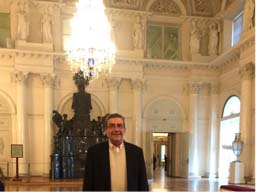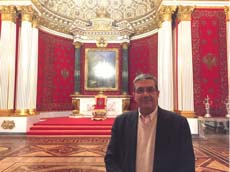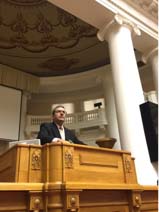St. Petersburg is coldly beautiful even on overcast late-winter days. There’s still ice on the Neva and the canals, with the wind-chill factor dropping to the lower 20’s in the  evening—a reminder that Russia’s imperial capital is a mere 7° south of the Arctic Circle. Its façades look fresher than when I was here last a decade ago, and many parts of the city’s elusive center now replicate the glitter of the Nevsky Prospekt
evening—a reminder that Russia’s imperial capital is a mere 7° south of the Arctic Circle. Its façades look fresher than when I was here last a decade ago, and many parts of the city’s elusive center now replicate the glitter of the Nevsky Prospekt
I am attending a conference on the 100th anniversary of the February Revolution, revisiting the sights (like the Winter Palace, a masterpiece of Italian Baroque), and using this opportunity to gauge the informed Russian opinion on Donald Trump’s first eight weeks in office. What follows is a composite summary based on a variety of academic and media sources.
The sense that the United States has badly mismanaged its relations with Russia since the end of the Cold War now pervades all significant shades of Russian opinion. As a veteran journalist put it over dinner on Saturday night, “for a quarter of a century, administrations of both parties have ignored our interests—and often violated international law—while pushing NATO to our borders and treating Russia condescendingly. Over the years such treatment had become so normal for the American policymakers, that candidate Trump’s call for normal relations sounded radical.”
Most of my Russian contacts now think that those relations are unlikely to be  normalized. There is a strong sense that Trump has given up on détente with Russia, and there is dismay at the tone and quality of public discourse on all things Russian in the U.S. “We have never seen anything remotely similar during the Cold War,” says a former Russian diplomat. “Such ongoing hate fest, it’s unhinged. It is now coming even from Trump’s people, like [UN Ambassador] Niki Haley [who declared last week that we should never trust Russia]. It’s impossible to have a rational debate on these terms. If you can never trust someone, then you are saying that you can never have any kind of treaty or formal agreement with him.”
normalized. There is a strong sense that Trump has given up on détente with Russia, and there is dismay at the tone and quality of public discourse on all things Russian in the U.S. “We have never seen anything remotely similar during the Cold War,” says a former Russian diplomat. “Such ongoing hate fest, it’s unhinged. It is now coming even from Trump’s people, like [UN Ambassador] Niki Haley [who declared last week that we should never trust Russia]. It’s impossible to have a rational debate on these terms. If you can never trust someone, then you are saying that you can never have any kind of treaty or formal agreement with him.”
Explanations for Trump’s apparent volte-face differ, and may be divided into two schools. Some Russians think that he was serious about turning a new leaf in his campaign statements, as reflected in his first telephone conversation with Putin, but that the counter-pressure from the Deep State proved just too great. “On treating Russia as a potential partner he encountered a solid rejection front, left and right, conservative and liberal, which extends even into his own team,” says a think-tank analyst. “Following the torrent of allegations about his and his campaign’s supposed links to Moscow, however spurious they may be, he is now perhaps understandably reluctant to do anything that may make him look like too friendly to Putin.”
Others are of the opinion that Trump’s Russian détente had always been a tentative rather than firm policy option, the one on which in the end he was willing to  compromise in order to be able to pursue other parts of this agenda. “On foreign affairs Trump has taken many interesting positions which were obviously prepared by some policy realist,” says the former diplomat. “That does not mean that Trump has really internalized them, that the new paradigm was non-negotiable. He seems to have accepted rather quickly the establishment-imposed continuity—NATO as America’s strategic cornerstone in Europe, Russia as a perennial antagonist. He did so without much resistance, which is indicative that this was not a key issue for him. Still . . . a great, historic opportunity has been lost, since we really do not have any significant contentious issues.”
compromise in order to be able to pursue other parts of this agenda. “On foreign affairs Trump has taken many interesting positions which were obviously prepared by some policy realist,” says the former diplomat. “That does not mean that Trump has really internalized them, that the new paradigm was non-negotiable. He seems to have accepted rather quickly the establishment-imposed continuity—NATO as America’s strategic cornerstone in Europe, Russia as a perennial antagonist. He did so without much resistance, which is indicative that this was not a key issue for him. Still . . . a great, historic opportunity has been lost, since we really do not have any significant contentious issues.”
As for the future, most Russians still think that Trump in the White House is better than Hillary Clinton would have been. There will be no new dawn, the consensus goes, but at least the risk of turbulence and crisis-inducing moves has been reduced. “It’s a pity,” says my journalist friend. “I actually believed that what Trump had heralded vis-à-vis Russia was possible, which only goes to show that I do not know Washington well enough.”
Leave a Reply